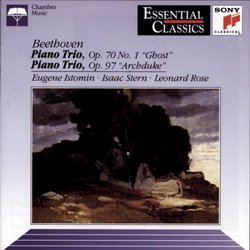| All Artists: Beethoven, Istomin, Stern, Rose Title: Beethoven: Piano Trios Op. 70/1 & Op. 97 Members Wishing: 0 Total Copies: 0 Label: Sony Release Date: 5/3/1994 Genre: Classical Styles: Chamber Music, Historical Periods, Classical (c.1770-1830) Number of Discs: 1 SwapaCD Credits: 1 UPC: 074645351421 |
Search - Beethoven, Istomin, Stern :: Beethoven: Piano Trios Op. 70/1 & Op. 97
 | Beethoven, Istomin, Stern Beethoven: Piano Trios Op. 70/1 & Op. 97 Genre: Classical
|
Larger Image |
CD Details |
CD ReviewsExpansive My Uncle Stu | Boston | 09/08/2005 (5 out of 5 stars) "Symphonies are a big deal. Symphonies are time-consuming and expensive to produce. They are the works composers slave over to both define themselves to the masses as well as to keep the bucks rolling in from their benefactors. I think of the chamber works as the more personal, more intimate pieces that the composers write more for their own enjoyment and for the enjoyment by their musician and composers friends. Don't get me wrong, nobody loves the Beethoven symphonies or concertos more than I do. But there's a time and place for the more intimate of Beethoven's works. This CD will make you a big fan of the piano trios. There is a good balance between the three instruments. Some have commented that having three virtuosos causes some tension, a competitive vibe between the performers. Maybe so but I wasn't aware of it, I thought the performances were all incredible and there was good communication between the musicians, nobody stepping on any one else's toes. In particular, the lyricism of the slow movements are rendered with an affecting warmth. The eerie opening of the Ghost Trio gave me goose bumps, and the expansive grandiosity of the Archduke revved me up almost as much as the Emperor Concerto. Buy it and thank me later. " Beautifully played Beethoven masterpieces! Mike Powers | Woolwich, ME USA | 05/09/2000 (5 out of 5 stars) "The "Archduke" and "Ghost" piano trios are two of Beethoven's most famous chamber works. Eugene Istomin (piano), Isaac Stern (violin) and Leonard Rose (cello) play with tremendous grace, warmth and vitality; their enjoyment of the music and of each other is readily evident. I found the first movement of the "Archduke" trio, with its majestic and yet somehow poignant melody, especially enjoyable. This is a re-mastering of analog recordings made in 1966 and 1970. The sound quality is excellent. The balance between the three instruments is just about perfect, giving the listener an excellent sense of realism and immediacy. I highly recommend this disc for all lovers of Beethoven's music." Good, But Not Great Jeffrey Lipscomb | Sacramento, CA United States | 05/16/2004 (4 out of 5 stars) "I first bought these performances on Columbia LPs back in the 1970's - they were my first recordings of the works and I played them to death. From the first moment I heard the beautifully spacious Adagio of the Archduke, it has remained my favorite piano trio (although, of course, Schubert's op. 100, the Ravel, and the Brahms #2 aren't very far behind in my affections).
Once thoroughly familiar with the music, I started to notice a few shortcomings in these performances. Like most "all-star" trio ensembles, one player tends to dominate. With the old Cortot-Thibaud-Casals, it was always the cellist. Here it is Isaac Stern - but at least we don't get the spotlight-hugging free-for-all of the old Rubinstein-Heifetz-Feuermann. In some recordings, one player is so emotionally neutral as to spoil the over-all effect - such for me was the case with the violinist in the Kempff-Szeryng-Fournier set. Unlike a string quartet, the piano trio is often the province of marquee soloists who don't play chamber music very often: they tend to ham it up or simply go their own way. I am sometimes reminded of three spinning tops that only randomly bump into one another. Such for me are the Barenboim-Zukerman-du Pre and Ashkenazy-Perlman-Harrell readings. And, to a certain extent, these Istomin-Stern-Rose sound that way, too. But "full-time" trio ensembles aren't always the best alternative: I have always found the Beaux Arts Trio to be mundane, unimaginative and rather insensitive. What to do? On the advice of a fellow chamber music fancier, I bought a hard-to-find import set on TelDec LPs in 1976 while visiting that mecca of classical record shops, the long-gone and much-missed Discophile in Greenwich Village. It featured a group I had never heard of before. Their few records are still much-prized among collectors and are rarely seen on the second-hand market: they are no doubt hoarded by those lucky enough to own them. I am speaking of the Trio di Trieste, with pianist Dario de Rosa, violinist Renato Zennatovich, and Libero Lana on cello. The Trio di Trieste "Archduke" is simply one for the ages. Hearing it is like standing outside the Gates of Heaven and listening to three Angels engaged in rarified conversation. Their Adagio is incredibly spacious and heartfelt, the Scherzo has a unique rhythmic zest, and the finale features the most imaginatively nuanced playing I have ever heard. It was coupled with a "Ghost" Trio that surpasses even my cherished Busch Trio recording. Hopefully, this recording - in beautiful 1954 mono sound - will find its way onto CD from a label like Testament. For me, it's THE recording to own if you're having only one." |

 Track Listings (7) - Disc #1
Track Listings (7) - Disc #1